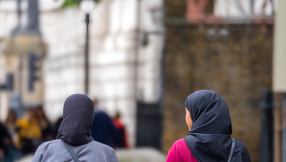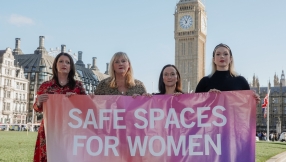Figures from the religious and political worlds are today paying tribute to Martin McGuinness, the former IRA chief of staff who became a key figure in the Northern Ireland peace process.
McGuiness has died just two months after stepping down as deputy first minister.
The 66-year-old Irish republican died in Derry's Altnagelvin hospital surrounded by his family, following a rare, short illness.
The high-point of McGuiness's controversial career was as Sinn Fein's lead negotiator during the Good Friday Agreement of 2008.
Gerry Adams, his closest republican ally, confirmed McGuinness's death and said this morning: 'Throughout his life, Martin showed great determination, dignity and humility and it was no different during his short illness. He was a passionate republican who worked tirelessly for peace and reconciliation and for the reunification of his country.'
Tony Blair, the former prime minister said: 'I grew up watching and hearing about the Martin McGuinness who was a leading member of the IRA engaged in armed struggle. I came to know the Martin McGuinness who set aside that armed struggle in favour of making peace. There will be some who cannot forget the bitter legacy of the war. And for those who lost loved ones in it that is completely understandable. But for those of us able finally to bring about the Northern Ireland peace agreement, we know we could never have done it without Martin's leadership, courage and quiet insistence that the past should not define the future...
'Over the years – through the arduous negotiation of the Good Friday agreement – and for the years after it, I got to know Martin well...
'Whatever the past, the Martin I knew was a thoughtful, reflective and committed individual. Once he became the peacemaker he became it wholeheartedly and with no shortage of determined opposition to those who wanted to carry on the war.'
Peter Lynas, Northern Ireland director of the Evangelical Alliance, said: 'We are praying for the family following the news...He was a complex character who significantly shaped Northern Ireland as both a senior figure in the IRA and as a politician. We acknowledge that many will find today difficult given Martin McGuinness's IRA past. However, we must also remember that he came on a significant journey of peace and reconciliation...Today I pray that Northern Ireland will continue on its journey towards peace and a thriving society. I pray for the many victims of the Troubles and their relatives. I pray for Martin's wife and family. And I pray that during this season of Lent, we will pause to reflect on Jesus's ultimate act of sacrifice that brings the opportunity of true freedom to everyone.'
Eamon Martin, the Archbishop of Armagh and Primate of All Ireland, said: 'I will remember Martin as someone who chose personally to leave behind the path of violence and to walk instead along the more challenging path of peace and reconciliation. As a leader he was courageous and took risks in order to bring others with him, convincing them that goals could be achieved by politics and persuasion. He channelled his many gifts into creating and sustaining the peace process of which he was one of the key architects. I have no doubt that Martin's faith and relationship with God guided him along this journey. He was a man of prayer and I am personally grateful for his good wishes and encouragement to me, as a fellow Derry man, in my own vocation.
'The story of conflict in Ireland has brought much pain and trauma and I thank God that in recent years we have preferred peace to the horror of violence and war. People like Martin McGuinness have made an immense contribution to sustaining peace by reaching out a hand of friendship and reconciliation and being prepared to model alternatives to dispute and division. Martin's personal warmth and open, friendly personality was able to melt away suspicion and help build trust with those coming from very different perspectives.'
Bertie Ahern, who was taoiseach at the time of the Good Friday agreement, said McGuiness was a 'good person'. He said: 'He was a good person in my view. He moved from a very difficult past where he took a particular side and he was a good person to negotiate with and certainly I considered him as a good friend as we went through 25 years of discussions.'
The Moderator of the General Assembly of the Presbyterian Church in Ireland, Dr. Frank Sellar, said: 'Few public figures have made such a journey from violence to peace as Martin McGuinness and many people will acknowledge the contribution and commitment to the common good which he made in the latter part of his life.'
Theresa May, the Prime Minister said: 'While we certainly didn't always see eye-to-eye even in later years, as deputy first minister for nearly a decade he was one of the pioneers of implementing cross-community power-sharing in Northern Ireland. He understood both its fragility and its precious significance and played a vital part in helping to find a way through many difficult moments. At the heart of it all was his profound optimism for the future of Northern Ireland – and I believe we should all hold fast to that optimism today.'
There was stinging criticism, however, from Lord Tebbit, the former Conservative party chairman whose wife Margaret was paralysed when the IRA bombed the Grand Hotel in Brighton during the Conservative party conference.
Lord Tebbit said: 'I'm just pleased that the world is a sweeter and cleaner place now. He was not only a multi-murderer, he was a coward.
'He knew that the IRA were defeated because British intelligence had penetrated right the way up to the army council and that the end was coming. He then sought to save his own skin and he knew that it was likely he would be charged before long with several murders which he had personally committed and he decided that the only thing to do was to opt for peace. He claimed to be a Roman Catholic. I hope that his beliefs turn out to be true and he'll be parked in a particularly hot and unpleasant corner of hell for the rest of eternity.'













